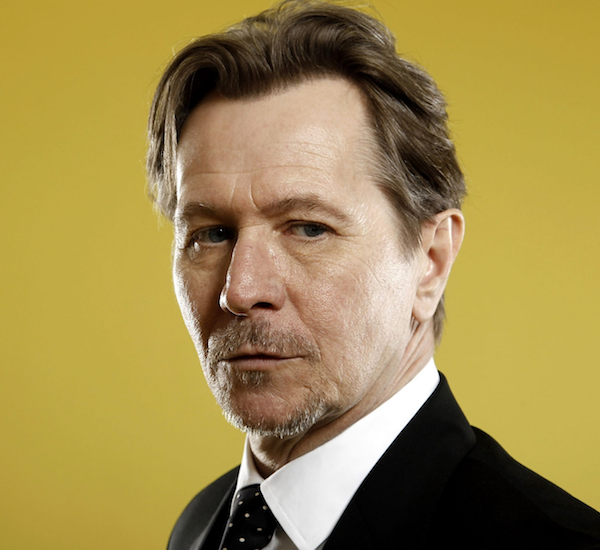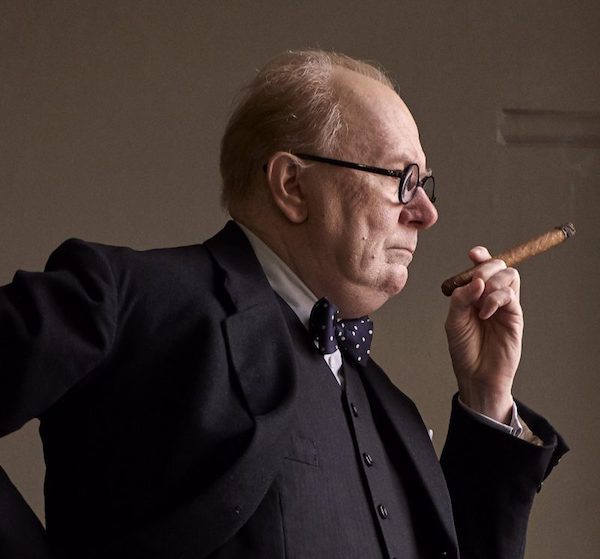The Golden Globe Awards will be presented a week from Sunday; the Oscars on March 4. These star-studded and self-adulatory events are bound to be restrained by Hollywood’s year of scandal, and a friend in-the-know tells me she expects the celebrity presenters to redirect their anguish and frustration at – who else? – Donald Trump.
Meanwhile, there are 2017’s movies to be celebrated, and two – in my opinion, only two – stand out as truly praiseworthy. Whether or not either will receive a statuette, I neither know nor care.
The first is Christopher Nolan’s Dunkirk, which I reviewed here upon its release in July. The second is Joe Wright’s Darkest Hour, a November release, which – for various reasons – I was unable to watch until the other day. (But note: As of December 22, the film is now in wide re-release.) Both films are set in 1940 and both detail the crisis that befell Great Britain at the start of World War II.
Indeed, the evacuation of 300,000 British military personnel from the beaches of northern France, which was the sole subject of Mr. Nolan’s film, is the background for Mr. Wright’s tale of Winston Churchill’s first months as Great Britain’s Prime Minister.
Churchill makes a kind of cameo at the end of Dunkirk, when a soldier – saved from certain death by the famous flotilla of private yachts – reads Churchill’s speech to Commons in which he expresses hope (faint hope as he spoke) that the New World will come to rescue of the Old “in God’s good time.” That speech also ends Darkest Hour.

Dunkirk is a superb film. Darkest Hour, however, surpasses it, not in every way – not in its scope or visual power – but in one particular way: the performance of Gary Oldman as Churchill**.
It has been said of some performances that an actor disappears into a role, and never has that been more true than here. There was only one moment in Darkest Hour – surprisingly, a straight-on shot – when I actually glimpsed Mr. Oldman’s face. It was wonderfully jarring. But I never detected Oldman in mannerism or voice. He simply is Winston Churchill, and this owes much to the brilliance of the makeup artists, led by Kazuhiro Tsuji, who transformed Oldman into Churchill. (Apparently, Oldman had to talk the 47-year-old Tsuji out of “retirement” to do the job.)
I’ve seen four of Joe Wright’s other films, each of which I liked, but none prepared me for the brilliance of his work in Darkest Hour. Great films may be about great men and great events, as this one is, but a film’s greatness rests on things not “great” in the grand sense, especially in evocations of character, often – in film (as in real life) – revealed in small moments, micro gestures, and other details, visual and audible. A fine director and a great actor discover these things together, which is why film is the most collaborative of all the arts.
But the truest measure of Mr. Wright’s skill – with the able assistance of screenwriter Anthony McCarten, who in turn had the able assistance of Churchill’s speeches and copious writings – is the way he creates a high level of tension in a story the end of which we all know well.
The drama of getting “our boys” off the beaches of Dunkirk before they are slaughtered by advancing German forces is actually a subplot in Darkest Hour, in which the greater drama and finer details are in its account of Churchill’s conflicts with key members of his War Cabinet, especially Neville Chamberlain (Ronald Pickup), whom Winston has just replaced as Prime Minister, and with the Foreign Minister, Viscount Halifax (Stephen Dillane), who share a belief that Britain’s only hope in this darkest hour is, ultimately, a negotiated settlement with Adolf Hitler.
One understands why these men sought, as Chamberlain had earlier described it, “peace in our time.” The Allies, which did not yet include the United States, were losing – and badly – and Churchill’s 1940 optimism seemed nearly delusional.

To watch Oldman being Churchill being all but crushed by the weight of German successes and Allied failures is to witness what may be the best performance of the 21st century so far. To later watch Oldman’s Churchill rise up from near despair to a more refined optimism, one that rallied the British people to be steadfast in the battle against one of history’s greatest evils, is to be moved to tears.
But, of course, I cry easily.
In a scene that may or not portray actual events, Churchill takes his case for steadfastness and fortitude to the people. At the end of my review of Dunkirk, I wrote: “Tom Hardy wins the war!” (Mr. Hardy plays an RAF pilot giving air support during the Dunkirk evacuation.) Watching the scene in Darkest Hour I’m referring to here (but won’t go into to save the reader the pleasure of watching it with no diminishment of its impact), I thought: Winston rides the Underground! And wins the war!
What does either of these great films have to do with our Catholic thing? Nothing directly connected to the faith. (There IS one brief scene in which some nuns are seen walking along a London street. Anglican Benedictines probably.) Yet Darkest Hour is truly a spiritual experience.
Aquinas asks (ST, Q.123): “Whether fortitude is a virtue?” It is. Then: “Whether fortitude excels among all other virtues?” It does. Why? Because, St. Thomas explains, “fear of the danger of death has the greatest power to make man recede from the good of reason.” The danger of death . . . or of defeat.
The Angelic Doctor concludes by quoting one of his favorite sources, Aristotle, who notes, “just and brave men are most beloved, because they are most useful in war and peace.”
That was Winston Churchill.
___
Mr. Oldman has received a Golden Globe nomination for his performance, but Darkest Hour did not receive a nomination as Best Drama nor did Mr. Wright in the director category. Darkest Hour is rated PG-13 (some rough language) and features fine supporting performances by Kristin Scott Thomas as Clementine Churchill and Lily James as Churchill’s secretary.
** Congratulations to Mr. Oldman for his well-derserved Golden Globe. *** And his Oscar.














